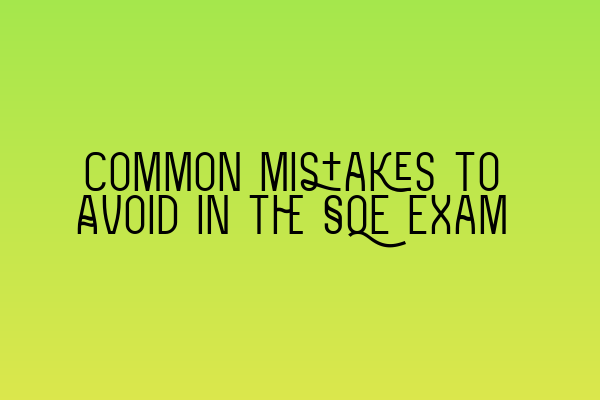Common Mistakes to Avoid in the SQE Exam
Preparing for the Solicitors Qualifying Exam (SQE) can be a challenging and rigorous process. The SQE assesses your knowledge and skills to determine your eligibility for qualification as a solicitor in England and Wales. To help you succeed in the exam, it is crucial to understand and avoid common mistakes that candidates often make. In this article, we will discuss some of these mistakes and provide you with valuable tips to improve your chances of passing the SQE.
1. Lack of Familiarity with the Exam Format
One of the most significant mistakes candidates make is not thoroughly understanding the format of the SQE. The exam consists of two stages: SQE1 and SQE2. SQE1 assesses your functioning legal knowledge, while SQE2 evaluates your practical legal skills. It is essential to familiarize yourself with the exam structure, question types, and time management strategies for each stage. This will help you allocate your study time effectively and approach the exam with confidence.
For more information on the SQE exam format, you can check out this article on mentorship for aspiring solicitors.
2. Insufficient Preparation Time
Another common mistake is underestimating the amount of preparation required for the SQE exam. Given the breadth and depth of legal knowledge and skills tested, it is crucial to allocate sufficient time for study and revision. Create a study plan that covers all the topics and practice areas included in the exam syllabus. Additionally, make sure to allocate time for mock exams and revision to gain familiarity with the exam environment and improve your performance.
To enhance your preparation, you may find this article on alternative dispute resolution helpful.
3. Neglecting Legal Research and Case Law
Avoid the mistake of neglecting legal research and case law analysis in your preparation. The SQE exam requires a sound understanding of legal principles and their application to practical scenarios. Familiarize yourself with key legal concepts and stay updated with recent case law developments. Practice analyzing case scenarios and applying the relevant legal principles to demonstrate your ability to think like a solicitor.
If you want to improve your legal research skills, you can refer to this article on mastering client care skills.
4. Ignoring the Importance of Legal Writing
Effective legal writing is a crucial skill for solicitors, and it is assessed in the SQE exam. Many candidates make the mistake of overlooking the importance of legal writing and fail to practice this skill adequately. Develop your ability to articulate legal arguments clearly and concisely. Practice drafting legal documents, such as letters, legal advice, or witness statements, to improve your written communication skills.
If you want to explore the benefits of becoming a solicitor and the advantages of a legal career, you may find this article helpful.
5. Failure to Manage Exam Stress
Exam stress can significantly impact your performance in the SQE exam. Many candidates make the mistake of not addressing their stress levels effectively. Develop strategies to manage exam-related stress, such as practicing mindfulness, engaging in regular exercise, and maintaining a balanced lifestyle. Prioritize self-care throughout your exam preparation to stay focused and perform at your best on exam day.
For more insights into the future of legal services and technological advancement, you may find this article on law tech and digital transformation beneficial.
6. Lack of Practice on Sample Questions
Practicing sample questions is an essential aspect of SQE exam preparation that some candidates overlook. It is crucial to expose yourself to various question types and practice answering them within the allocated time. This will help you become familiar with the exam format, boost your confidence, and identify any knowledge gaps that need to be addressed. Make use of past papers and online resources to access a wide range of sample questions.
Avoid these common mistakes, and you will be well on your way to success in the SQE exam. Remember to allocate sufficient time for preparation, focus on your legal research and writing skills, and manage your exam stress effectively. Stay confident, stay motivated, and approach the exam with a positive mindset. Best of luck!

Leave a Reply